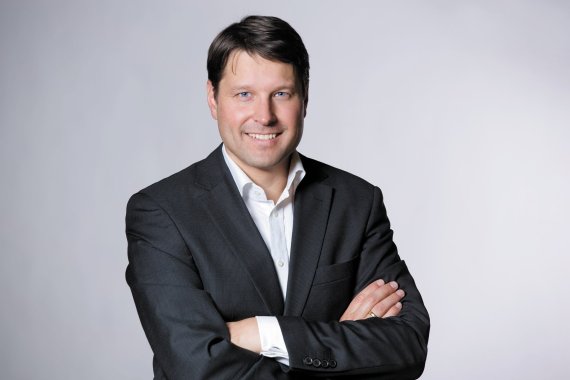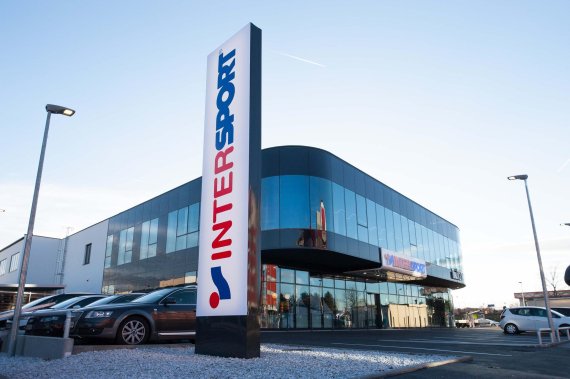
To many people tasks like finances, logistics, IT and controlling sound highly important, although rather boring. Hannes Rumer, the newly appointed CFO of Intersport Germany has already had to deal with such affairs as managing director of Takko, the price-driven German apparel chain.
Complex work in a retailer network
He had to laugh, though, when we asked him whether it’s always the same kind of work: “No, fortunately, it’s not. When it comes to finance, my first consideration is the group’s money, i.e. the finances handled by the network’s headquarters. In a buying group, however, you also have to bear the financial situation of the affiliated retailers in mind.”
According to Rumer, a retail chain like Takko is responsible only for its own financial performance. Therefore, the job is far more complex in a retailer network, he says. “Intersport is not just a buyer and a re-seller, but service provider to a wide range of companies with different sizes and different strategies. In addition, the assortment is far more diverse. These are challenging tasks to fulfill.”

Rumer emphasizes, however, that there are quite a few things that can be learned from chains like Takko: The same as with any other retailer, one fundamental rule applies. The right merchandise must be at the right location at the right time. “That’s a very demanding challenge. I believe, that I bring a lot of valuable experience in here from my former employer.”
“Much more to it than just deliveries”
Besides all the similarities which are typical for both specialty buying group retailing and a large chain, we were intrigued by the possible differences between the two distribution channels. Hannes Rumer describes them like this:
“Buying groups are all about people – they’re at the center of all efforts. Not just with regard to end consumers, but also to retailers and their staff. That’s what makes my new job an interesting challenge. It’s about more than just delivering merchandise. There’s much more to it. We need to be able to update our offer which independently acting entrepreneurs decide on – on a daily basis.”
We saw Rumer and the other members of the executive board, Kim Roether (chairman) and Jochen Schnell (merchandise, purchase, marketing) shortly before Christmas. The recently completed trio of operational leaders analyzed the performance of the group in 2015 and provided an outlook on new projects in the short and longer run.
Growth in spite of lower soccer sales
They said that year-to-date growth at the retail level as of Dec. 7 was 2 percent compared with the previous year. The projection remained imprecise because it was given well before the end of Christmas business. This increase is remarkable, as the affiliated retailers enjoyed no major soccer event during this outgoing year. Sales in the teamsports category were, as expected, down in the double digits.
The other product segment which booked a decline was actually racquet sports. Jochen Schnell emphasized that this was not due to a lower demand from tennis enthusiasts, but derived rather from the strategic decision of some retailers to drop the category, as it was not in their focus. All other segments, including snow sports, were up compared with the prior year.
More differentiation through stronger private labels
As far as future strategy is concerned, Kim Roether defined a target for the group’s exclusive brands. The plan is that affiliated shops make 20 percent of their sales with private labels. The current share of them compared with the total sales value is around 16 percent. Roether pointed out that having an exclusive offer was a critical tool to differentiate Intersport retailers from the competition. What’s more, for private labels, it’s easier for the group to control, at least to a certain extent, the way merchandise flows through web-based sales channels.
Another focus of next year’s efforts is customer relationship management. In 2016, Intersport intends to set up a new coupon card. It was said that research reveals that coupons increase sales in shops substantially. The management stressed that Intersport plans to introduce the card itself and not in partnership with retailers from other industries.

 Sports BusinessSki Mountaineering Goes Olympic: What Milano-Cortina 2026 Means
Sports BusinessSki Mountaineering Goes Olympic: What Milano-Cortina 2026 Means
- ISPO awards
- Mountain sports
- Bike
- Design
- Retail
- Fitness
- Health
- ISPO Job Market
- ISPO Munich
- ISPO Shanghai
- Running
- Brands
- Sustainability
- Olympia
- OutDoor
- Promotion
- Sports Business
- ISPO Textrends
- Triathlon
- Water sports
- Winter sports
- eSports
- SportsTech
- OutDoor by ISPO
- Heroes
- Transformation
- Sport Fashion
- Urban Culture
- Challenges of a CEO
- Trade fairs
- Sports
- Find the Balance
- Product reviews
- Newsletter Exclusive Area
- Magazine



